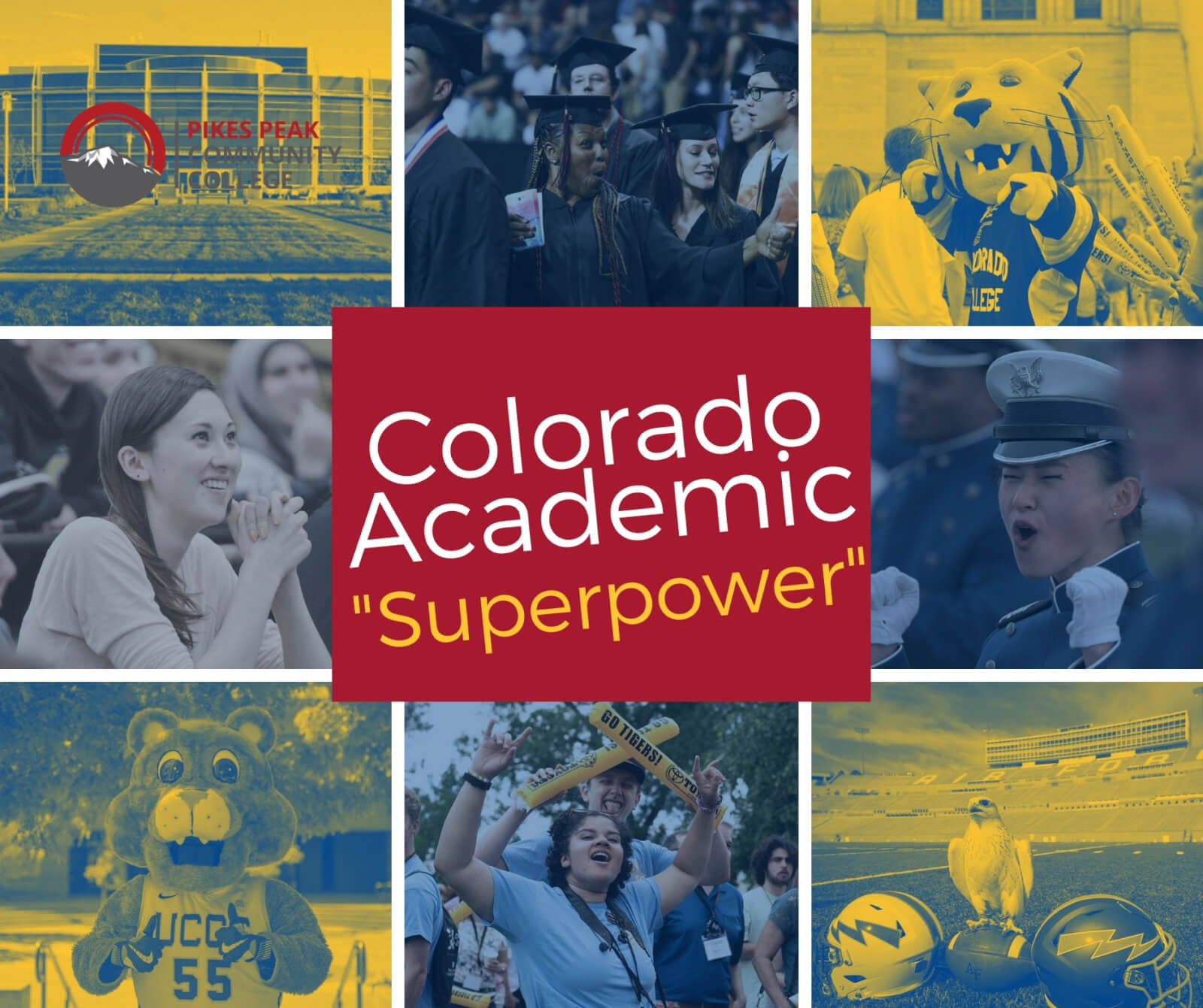Academy, local colleges combine to create academic ‘superpower’

Story by Ray Bowden, graphic by Tech. Sgt. Ben Stratton
U.S. AIR FORCE ACADEMY, Colo. — Cadets and college students in Colorado Springs say their academic partnership pays off by solving problems for the community.
The Air Force Academy, Colorado College, Pikes Peak Community College and University of Colorado-Colorado Springs, are members of “The Quad” – The Quad Innovation Partnership – students and faculty from each school who tackle issues for Colorado Springs.
“One special quality the Quad offers cadets is that it helps them become adept at building partnerships within their civic communities,” said Col. Chris McClernon, the Academy’s associate dean of research. “Community relationship-building is a critical skill they’ll need as future officers at any level.”
One project has the Quad working with suicide prevention experts from the Air Force, the Colorado University School of Medicine, El Paso County and Veterans Affairs, to put a dent in the Defense Department’s suicide trends. Another is decreasing energy use in Colorado Springs.
“We’re seeing extraordinary crossover of information and resources from Quad projects to Academy research,” said Lt. Col. Devlin Kostal, a Quad faculty advisor and military and strategic studies instructor at the Academy.
Jake Eichengreen, the Quad’s executive director, said the Quad is the only initiative in the U.S. to combine students from a private liberal arts college, a regional community college, a state university and a service academy.
Proposed projects on the Quad’s horizon include helping the City of Colorado Springs develop a strategy to use the Federal Opportunity Zone tax credit program to accelerate the post-COVID-19 pandemic recovery, helping nonprofits and small businesses access components of resiliency and strengthen attributes that support long-term sustainability and boost public trust in Colorado Springs.
“In my mind, the No. 1 benefit of including cadets as part of this initiative is the unique perspective and capability they offer,” Eichengreen said. “The Quad’s ‘superpower’ is how many different perspectives are convened and work together under the Quad banner.”
Cadet 3rd Class Manmeet Pelia, an electrical and computer engineering major, is on a Quad team working to decrease energy use in Colorado Springs.
“Colorado Springs set a goal of reducing emissions by 80% by 2030 and 90% by 2050,” she said.
Pelia said the Quad works with community leaders and private and public organizations.
“Through research projects and other tasks we get a chance to solve nationwide problems for our community,” she said. “It’s an amazing collaboration we would never have connected with without our participation in the Quad.”
Giselle Rangel, a senior majoring in geography and environmental studies at the UCCS said she and other students and cadets worked with Colorado Springs Utilities to engage young people in developing a “Smart City.”
Smart Cities are urban areas using electronic methods and sensors to collect information to manage resources and improve operations.
“I think it’s incredibly positive for cadets and civilians to be involved together in the community,” Rangel said. “The cadets bring valuable skills that combine and mesh with those of civilians.”
Rangel said working with cadets made her appreciate the importance of bringing diverse people together to solve problems.
“The Academy cadets brought valuable skills to the group that proved irreplaceable,” she said. “I learned a lot from the cadets, making my experience positive.”
Kostal said participation in the Quad allows cadets to accomplish some of the Academy’s “key outcomes”: critical thinking, understanding the human condition, communication, leadership and teamwork.
“Quad problems are typically like nothing cadets have experienced before,” he said. “Helping a Colorado Springs nonprofit plan a food waste composting facility, mapping opportunities for Colorado Springs to implement Smart City technologies over the next 10 years, and analyzing juvenile suicide trends in El Paso County.”
The Quad began in 2014 when then-Academy superintendent, retired Lt. Gen. Michele Johnson, and her Quad colleagues developed the pilot program that produced the Quad structure. Since then, Eichengreen said, “94% of Quad students feel “more or much more” ready for their professional lives after college, regardless of which school they attend,” according to a 2018 survey.
The Academy has signed an Educational Partnership agreement with each school, which establishes the legal parameters of their partnership and authorizes cadets to participate.
Academy Superintendent Lt. Gen. Richard Clark is the Academy’s liaison on the Quad board, along with interim Co-President of Colorado College Mike Edmonds, President of Pikes Peak Community College Lance Bolton and Chancellor of UCCS Venkat Reddy.